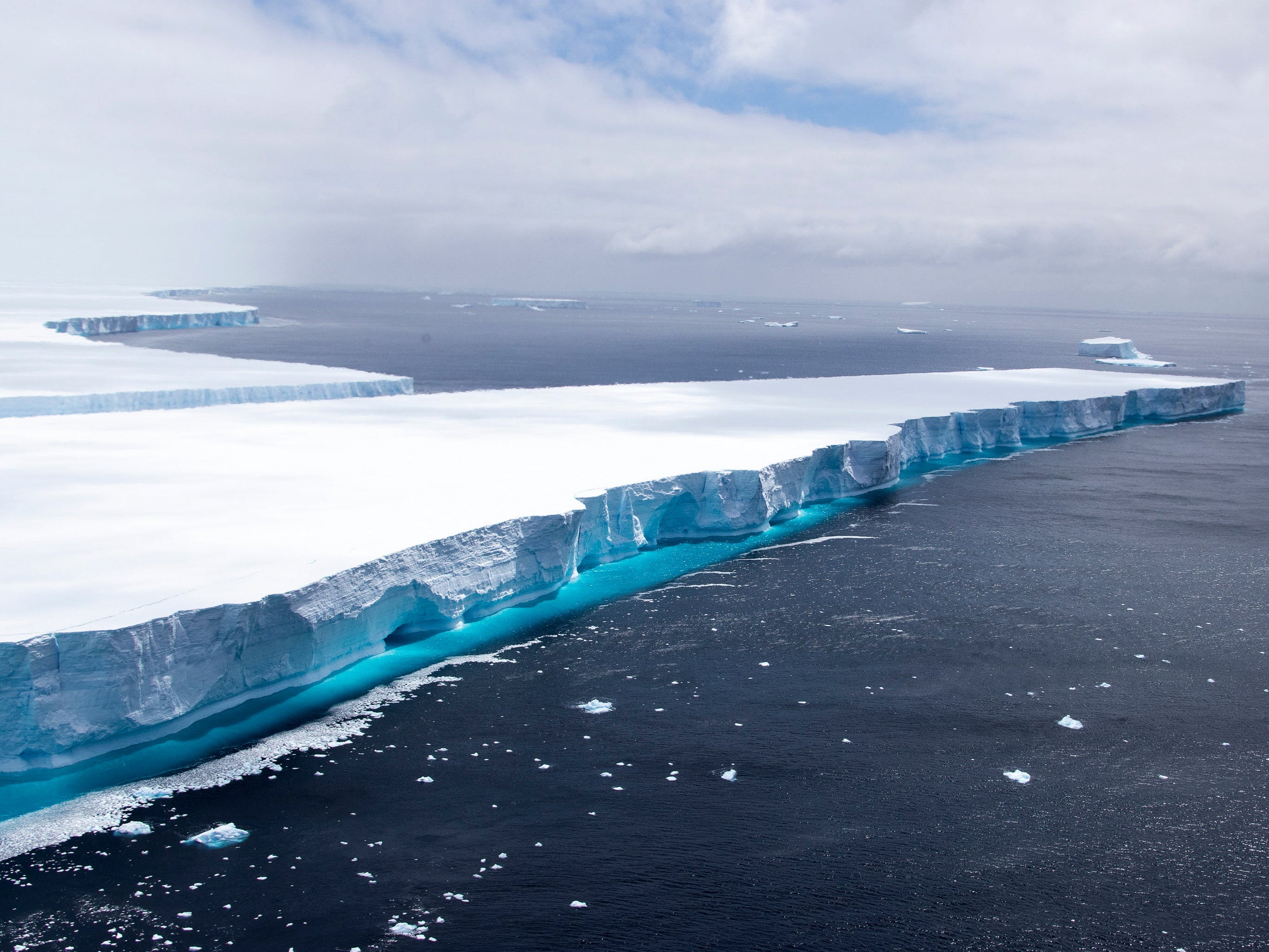Climate crisis: Scientists ‘identify missing link’ in formation of ice ages
Movement of Antarctic icebergs could disrupt ocean currents and pull huge volume of greenhouse gases out of atmosphere, study suggests

Your support helps us to tell the story
From reproductive rights to climate change to Big Tech, The Independent is on the ground when the story is developing. Whether it's investigating the financials of Elon Musk's pro-Trump PAC or producing our latest documentary, 'The A Word', which shines a light on the American women fighting for reproductive rights, we know how important it is to parse out the facts from the messaging.
At such a critical moment in US history, we need reporters on the ground. Your donation allows us to keep sending journalists to speak to both sides of the story.
The Independent is trusted by Americans across the entire political spectrum. And unlike many other quality news outlets, we choose not to lock Americans out of our reporting and analysis with paywalls. We believe quality journalism should be available to everyone, paid for by those who can afford it.
Your support makes all the difference.The precise mechanisms which lead to the onset of the huge glaciations known as ice ages are not fully understood, but scientists claim they have now found a “missing link” which could help explain what triggers the many chain reactions which together plunge our planet into prolonged periods of cold temperatures.
Researchers have suggested that when certain conditions are in place, the melting of Antarctic icebergs could play a large, and previously unrecognised role in driving the onset of ice ages.
Ice age cycles are already known to be paced by periodic changes to Earth’s orbit of the Sun over thousands of years – this process changes the amount of solar energy which reaches our planet.
But until now, it has remained a mystery how the small variations in solar energy this process has on the Earth could account for such dramatic shifts in the climate.
In their study, the international team of researchers suggest that when the orbit of Earth around the Sun is just right, Antarctic icebergs begin to melt further and further away from Antarctica.
This process means huge volumes of freshwater are moved away from the Southern Ocean and into the Atlantic Ocean.
As the Southern Ocean gets saltier and the North Atlantic gets fresher, large-scale ocean circulation patterns begin to dramatically change, pulling CO2 out of the atmosphere and reducing the so-called greenhouse effect.
This in turn pushes the Earth into ice age conditions.
In their effort to understand and reconstruct past climate conditions which could have had a bearing on the onset of ice ages, the team assessed ocean sediments recovered by the International Ocean Discovery Programme (IODP).
The team identified tiny fragments of Antarctic rock dropped in the open ocean by melting icebergs.
The sediment records represent over 1.6 million years of history and therefore includes one of the longest archives of the movement of Antarctic icebergs.
The team found the occurrence of these deposits, known as “ice-rafted debris”, appeared to consistently be associated with changes in deep ocean circulation, reconstructed from the chemistry of tiny deep-sea fossils called foraminifera.
Using new climate model simulations to test their hypothesis, the team found that huge volumes of freshwater could be moved by the icebergs.
Lead author of the study Aidan Starr, from Cardiff University's School of Earth and Environmental Sciences, said: “We were astonished to find that this lead-lag relationship was present during the onset of every ice age for the last 1.6 million years. Such a leading role for the Southern Ocean and Antarctica in global climate has been speculated but seeing it so clearly in geological evidence was very exciting.”
Professor Ian Hall, co-author of the study and co-chief scientist of the IODP expedition, also from the School of Earth and Environmental Sciences, said: “Our results provide the missing link into how Antarctica and the Southern Ocean responded to the natural rhythms of the climate system associated with our orbit around the Sun.”
Over the past 3 million years the Earth has regularly plunged into ice age conditions, but we are presently at an interglacial period when temperatures are warmer.
However, due to the warming resulting from anthropogenic greenhouse gas emissions, the researchers suggest the natural rhythm of ice age cycles may be disrupted.
As temperatures rise, the Southern Ocean will likely become too warm for Antarctic icebergs to travel far enough to trigger the changes in ocean circulation required for an ice age to develop.
Professor Hall said the study could help us understand how icebergs’ movements – or lack of movement – could inform future climate patterns.
“As we observe an increase in the mass loss from the Antarctic continent and iceberg activity in the Southern Ocean resulting from warming associated with current human greenhouse-gas emissions, our study emphasises the importance of understanding iceberg trajectories and melt patterns in developing the most robust predictions of their future impact on ocean circulation and climate,” he said.
Professor Grant Bigg, from the University of Sheffield's Department of Geography, who contributed to the iceberg model simulations, said: “The groundbreaking modelling of icebergs within the climate model is crucial for identifying and supporting the ice-rafted debris hypothesis of Antarctic iceberg meltwater impacts which are leading glacial cycle onsets.”
The research is published in the journal Nature.




Join our commenting forum
Join thought-provoking conversations, follow other Independent readers and see their replies
Comments